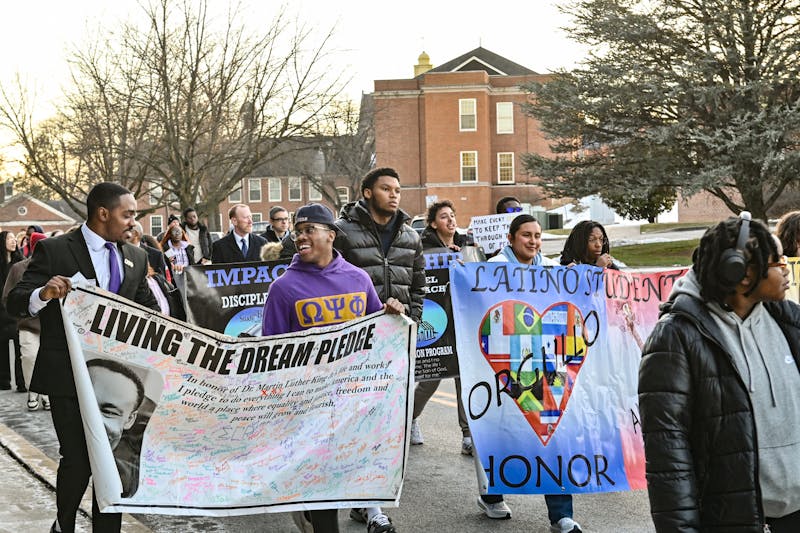Most Shippensburg University students probably did not know that the Pennsylvania Governor gave his annual budget proposal – let alone that he wants to potentially give them more than $200 million.
Pennsylvania Gov. Tom Wolf (D) addressed the Pennsylvania General Assembly for his annual budget address on Feb. 4.
Most notably for SU students, Wolf proposed a scholarship program for Pennsylvania State System of Higher Education (PASSHE) students that would offer $204 million to students from lower-income families who are already eligible for federal Pell grants and state assistance.
“The $204 million Nellie Bly Scholarship Program would close the gap after a student’s Pell Grant and other state grants to enroll in a Pennsylvania State System of Higher Education (PASSHE) university, allowing more students to graduate on time with less student loan debt,” the release said.
Wolf’s budget, if approved, would also invest $12.9 million to support PASSHE’s ongoing system redesign and $30 million more for the Pennsylvania State Grant program. The program currently serves more than 130,000 students and Wolf’s additional allocation would increase the maximum award to $4,700, according to the release.
To be eligible, students must be PASSHE, full-time undergraduates who qualify for a federal subsidized student loan. Students must commit to living in Pennsylvania after graduation for the same number of years they received the scholarship. If a student leaves early, they must repay the money, according to the release.
David Pidgeon, PASSHE director of public relations, said if Wolf’s proposal passes, it would mean financial support for 25,000 more students.
“It’s certainty indicative of a renewed relationship between the State System and our partners at the State,” he said. “While we have a lot of work to do together, especially at the State System as we seek ways to ensure public higher education is affordable and relevant to today’s job market, we’re grateful for proposals like this one from Gov. Wolf.”
PASSHE Chancellor Daniel Greenstein thanked the Wolf and his administration, praising the governor’s efforts.
“Student success and affordability drive our ongoing effort to redesign our system of 14 public universities, and to accomplish reform at such an unprecedented scale, the State System is renewing our partnership with the Commonwealth. Wolf’s announcement today illustrates what’s possible with this partnership,” Greenstein said.
Wolf reiterated during his address that Pennsylvania must be a place where students can pursue a college degree.
“Most good-paying jobs require training after high school, but too many students and families can’t afford the rising cost of college. The Nellie Bly Scholarship Program will help thousands of students to go to college, get a degree and start a career in Pennsylvania,” Wolf said.
“Let’s bet on our kids instead of bankrolling racehorse owners,” Wolf said during his budget address on Feb. 4.
However, not everyone is pleased with Wolf’s proposal.
A group of “neigh”sayers, including members of The Pennsylvania Equine Coalition, said the decision to repurpose funds from revenues from the Horse Racing Development Fund to benefit college students would “destroy” a $1.6 billion industry for the Commonwealth.
“If approved by the legislature, this raid would result in the end of horseracing in Pennsylvania by eviscerating the primary funding source for the purses and breeder incentives that serve as the lifeblood of the industry,” said Pete Peterson, executive director of The Pennsylvania Equine Coalition, an organization representing the six Thoroughbred and Standardbred horsemen and breeder associations in the state. “This scheme would destroy an industry that provides a $1.6 billion economic impact and supports an estimated 16,000 to 23,000 jobs in the agriculture, manufacturing, construction, retail and hospitality industries here in Pennsylvania.”
Liz Fisher, an SU social work professor, said members of the SU chapter of the Association of Pennsylvania State College and University Faculties (APSCUF) expressed their support for Wolf’s efforts to further funding for higher education.
Rachel Richards, SU associate director of financial aid, said she hopes the state grants will increase, citing the threat of the funds remaining stagnant in recent years.
“Our hope is that enrollment will increase at all PASSHE schools due to now having more scholarship power that could align us with private schools in the state,” Richards said.
However, Peterson said Wolf’s proposal would devastate the horseracing industry.
“This scheme would destroy an industry that provides a $1.6 billion economic impact and supports an estimated 16,000 to 23,000 jobs in the agriculture, manufacturing, construction, retail and hospitality industries here in Pennsylvania,” he said.
Owners, breeders, jockeys and trainers expressed their concerns, including Renee Nodine, an equine vet at Horseshoe Valley Equine in Annville.
“It would be a complete disaster if Gov. Wolf takes $200 million from Pennsylvania’s horse racing industry. He is turning his back on hay farmers, breeders, and small businesses — and those are some of the hardest working people there are,” Nodine said.
The money that Wolf would divert to PASSHE would possibly provide scholarships, grants and loans, which are determined by students’ FAFSA and PHEAA paperwork.
“The FAFSA is the starting point for eligibility and most grant funds rely on the information obtained by the FAFSA to determine eligibility. Scholarships offerings are usually merit based, meaning students can qualify based on SAT and GPA scores from high school and cumulative GPA in college,” Richards explained.
She continued, “Every student should complete the FAFSA each year as a lot of scholarship require a FAFSA on file even if the student does not utilize the aid offered by filing.”
The Financial Aid Office is located in room 101 in Old Main and is open Monday – Friday 8 a.m.–4:30 p.m.


The Slate welcomes thoughtful discussion on all of our stories, but please keep comments civil and on-topic. Read our full guidelines here.